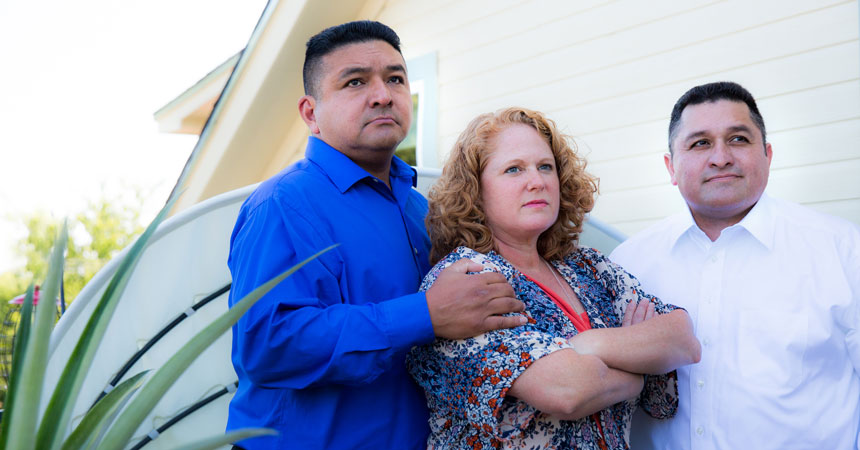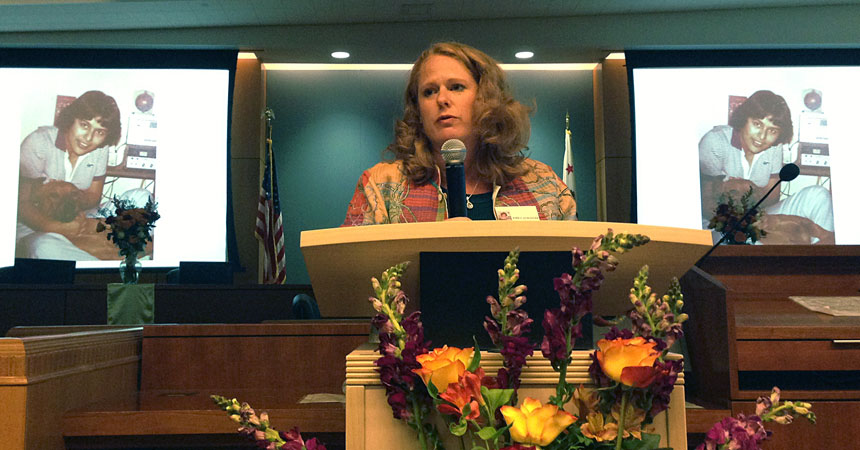Domestic violence’s painful legacy

In the fall of 1984, Maria Guadalupe Almaguer was murdered by her estranged husband, David Gonzales.
The couple had been separated for two years following a rocky, abusive relationship, and Maria had been saving for a divorce.
She had just been promoted at work, and things were slowly starting to go her way. She was feeling upbeat, thinking she might finally be ready to start dating someone new who would treat her right.
But Maria’s second chance at happiness was cut brutally short when she and a male friend were ambushed inside a California restaurant by Gonzales, who had been following them and slashed her tires on the way in.
Tensions exploded onto the parking lot, and as they attempted to flee, the beautiful young girl with so much life was fatally stabbed in the heart and back. Her companion was left bleeding and wounded. Maria’s last act before she died was to step in front of her friend in an attempt to shield him.
Maria was less than two months away from her 28th birthday.
Across miles and decades, her tragedy has had a profound impact on the life and career of UNT Health Science Center researcher Emily Spence-Almaguer, PhD.
In 2005, Dr. Spence-Almaguer, now Associate Dean for Community Engagement and Health Equity at the UNTHSC School of Public Health, began dating the man she would eventually marry. His name was Paul Almaguer, and he was Maria’s younger brother.
One evening early in their relationship, Paul asked about her day. That afternoon, Dr. Spence-Almaguer, who had spent the prior 14 years addressing domestic violence as a social worker and researcher, had given a presentation on the topic to Dallas law enforcement officers.
Paul listened, and then quietly said: “I understand. I have some personal experience with that.”
Staggering statistics

According to the National Coalition Against Domestic Violence (NCADV), an average of 20 people per minute across the U.S. are physically abused by an intimate partner, equal to more than 10 million men and women each year. On any given day, more than 20,000 phone calls are placed to domestic violence hotlines nationwide.
The CDC uses the term “intimate partner violence” to describe physical or sexual violence, stalking and psychological aggression, including coercive acts, by a current or former intimate partner.
Leaving does not guarantee safety.
A 2016 study by the Texas Council on Family Violence showed that 40 percent of women killed across the state had made attempts, like Maria, to end their relationships or were in the process of leaving when they were murdered.
“After they separated, David broke into Maria’s house several times, threatened and stalked her, frightening her friends and others who witnessed his behavior,” Paul said. “He attempted to strangle her at one point, until her roommates were able to intervene.”
Maria’s mother tried convincing her to move back home to Texas, but she liked California, where she had moved during the marriage, and she wanted to stay. She had friends there and was building a promising career.
“My sister was a very confident, independent and strong person, not easily intimidated, and she thought she could handle it. It just wasn’t in her to want to run and hide,” Paul said.
Families speak out

The pain for the families of domestic violence victims is terrible and lasting.
For Dr. Spence-Almaguer, the lingering trauma felt by her new husband and his family over Maria’s death prompted her to reroute her own career and to step back temporarily from domestic violence research.
“It was hard to talk about my work and have it trigger the worst trauma of my husband’s life,” she said.
Legislation like the California Victims’ Bill of Rights Act of 2008 has helped to expand opportunities for grieving families to advocate and represent their loved ones through the criminal justice system.
“Laws today are different from the early 1980s when Maria was killed,” Dr. Spence-Almaguer said. “Families now are considered victims too in many states, and have a voice with regard to court proceedings, parole hearings and restitution.”
In 2009, Arnold Almaguer, Maria and Paul’s brother, received a letter informing the family of their rights on behalf of Maria. It explained that Gonzales was up for parole and they had an opportunity to participate in the process.
“Until then, the only person representing my sister at hearings was Monterey County Deputy District Attorney Cynthia Jewett,” Arnold said. “She had been doing it all on her own, with a belief that David should stay incarcerated.
Solutions magazineRead more about UNTHSC’s people and programs in the latest issue of Solutions. |
“He had been pretty much a model prisoner and had a strong case for parole, but he still expressed intense hostility and showed no remorse for Maria’s murder. He seemed to be that same man who had said at trial that he felt ‘relieved’ when he learned my sister was dead.”
Jewett, now retired, remembers her decision to find Maria’s family. There wasn’t much to go on. Maria was listed by her married name in the sheriff’s report, Mary Gonzales. There was no mention of Almaguer and no family contact information, no note of her Texas ties.
“Laws were changing, and more effort was required to show that a prisoner would be dangerous if released. So I began having victims’ families contacted whenever they could be located,” Jewett said. “My examination of this case and Gonzales’ one disciplinary infraction in prison, a power struggle with a woman who taught a class, led me to believe that he was unrepentant and would be a danger in any future relationship. There was concern he could be a stalker.”
With help from a DA investigator, evidence records were reopened, and an old address book was found. Faded entries, written in pencil and barely legible, were recreated and eventually led to the Almaguer family.
Since then, Paul and Arnold have led the family’s effort in attending parole meetings and advocating for victims’ rights. Traveling to San Quentin State Prison and reliving the traumatic loss isn’t easy. But being able to confront Maria’s murderer and help keep him in prison gives comfort that they are honoring their sister’s memory and hopefully helping others.
“Through the hearings, it became less painful because we had to talk about it so much,” Dr. Spence-Almaguer said. “We came to see it as a way to raise awareness, which eventually helped me return to my domestic violence work.”
She has since led victim advocate trainings and spoken at the Monterey County Silent Witness Exhibit, where life-sized, red wooden silhouettes stand tall in representation of all the women lost through domestic violence.
Back home, Dr. Spence-Almaguer has taken teams to the streets to study interpersonal violence and victimization of the homeless in Tarrant County, helping to bring about real changes in safety, shelters and community services.
With federal funding, she also developed a Technology Enhanced Screening and Supportive Assistance (TESSA) program linking local health clinics, emergency medical services and victim safe centers to help those at risk and suffering from mental, physical and other stresses of abuse to get back on their feet.
“It’s not always the police that people go to for help when they’ve been victimized; it could be healthcare providers,” she said. “Certain effects of abuse can be seen years later, as the result of living with stress and strain or health problems exacerbated by trauma.”
The rates of domestic violence homicides in Texas reached their highest point in 10 years between 2015 and 2016.
That makes it critical, Dr. Spence-Almaguer said, “for programs like TESSA and a network of Tarrant County health providers and agencies to work together to promote victims’ safety and well-being.”
“There is still much work to do,” she said. “In domestic violence situations, people feel trapped and some, like Maria, feel they can handle it. For others, it might not be the right time to leave. Children, finances and other reasons come into play. As has been demonstrated recently through the national #MeToo movement, sometimes victims don’t feel like they’ll be believed or that they have the power to speak out. That’s why we stay committed to helping.”
Finding closure
On Facebook, loved ones, friends and supporters connect through a tribute page to Maria filled with loving photographs and notes in her memory.
“This site has been created,” it says, “to honor her memory, organize support to keep her abuser in prison, and raise awareness of the dangers of domestic violence and the horrific impact that it has on surviving friends and family.”
Last June, Paul and Arnold traveled back to San Quentin for Gonzales’ latest parole hearing. Their testimony helped secure another three years of incarceration for Maria’s murderer.
“Being active in this way brings a little bit of peace to our family,” Paul said. “I’ll bet my sister is proud of her little brothers, who are still looking out for her. I miss her.”





Social media